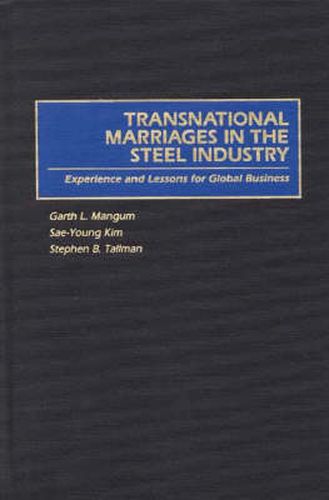Readings Newsletter
Become a Readings Member to make your shopping experience even easier.
Sign in or sign up for free!
You’re not far away from qualifying for FREE standard shipping within Australia
You’ve qualified for FREE standard shipping within Australia
The cart is loading…






Drawing upon case studies of firms in the steel industry, authors show that companies competing internationally can pool their strengths to offset their individual weaknesses, enabling them to build economically successful entities more easily than if each company tried to go it alone in competition with rivals. In doing so they show how the world steel industry emerged into a group of international joint ventures and how in each of these transnational marriages the whole became greater than the sum of its parts. Among the authors’ main points are: cultural conflicts are minimized by economic success but magnified by failure; expertise and commitment can overcome national differences, and even failing international joint ventures can be rehabilitated. Important reading for professionals in all areas of international business and for their colleagues in the academic community.
Included in each case study is a history of the firms and the emerging joint venture. Authors described the condition of facilities, the rehabilitation and construction of new facilities, the financial relationships between firms and the sources of funding, and their corporate structures. Cultural differences between firms and their impact on the success of the relationship are examined closely, with particular emphasis on personnel selection, training supervision, labor relations, retention and promotion policies and policies on tenure and layoff. Authors look at labor productivity and the use of participative management and other team approaches, relating them to such measurable variables as product quality, corporate profitability, and indeed the ultimate survival of each newly created firm. From there the authors show how the experiences of the steel industry and the lessons learned from its transnational alliances can be applied to other industries and to their own joint ventures.
$9.00 standard shipping within Australia
FREE standard shipping within Australia for orders over $100.00
Express & International shipping calculated at checkout
Drawing upon case studies of firms in the steel industry, authors show that companies competing internationally can pool their strengths to offset their individual weaknesses, enabling them to build economically successful entities more easily than if each company tried to go it alone in competition with rivals. In doing so they show how the world steel industry emerged into a group of international joint ventures and how in each of these transnational marriages the whole became greater than the sum of its parts. Among the authors’ main points are: cultural conflicts are minimized by economic success but magnified by failure; expertise and commitment can overcome national differences, and even failing international joint ventures can be rehabilitated. Important reading for professionals in all areas of international business and for their colleagues in the academic community.
Included in each case study is a history of the firms and the emerging joint venture. Authors described the condition of facilities, the rehabilitation and construction of new facilities, the financial relationships between firms and the sources of funding, and their corporate structures. Cultural differences between firms and their impact on the success of the relationship are examined closely, with particular emphasis on personnel selection, training supervision, labor relations, retention and promotion policies and policies on tenure and layoff. Authors look at labor productivity and the use of participative management and other team approaches, relating them to such measurable variables as product quality, corporate profitability, and indeed the ultimate survival of each newly created firm. From there the authors show how the experiences of the steel industry and the lessons learned from its transnational alliances can be applied to other industries and to their own joint ventures.